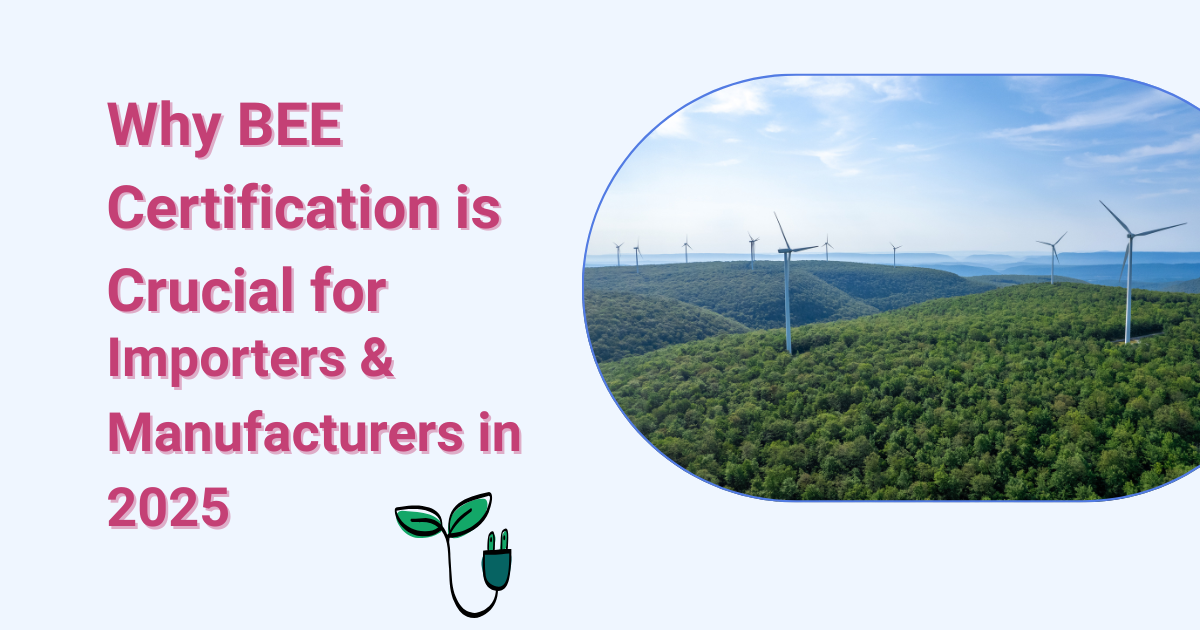What is BEE Certification?
The Ministry of Power in India is home to the Bureau of Energy Efficiency (BEE). Under the Standards & Labeling Program, it requires energy labeling for a few appliances, assisting customers in selecting energy-efficient goods. From 1-star (least efficient) to 5-star (most efficient), the distinctive star rating label serves as a representation of BEE certification.
Whether you're an importer bringing in appliances from outside or a producer making items in India, several product categories require the BEE certification, such as:
- Refrigerators
- Air conditioners
- LED lights
- Geysers
- Ceiling fans
- Washing machines
- TVs, and more
Why BEE Certification is Crucial in 2025
Mandatory for Market Entry
The Government of India continues to expand the list of appliances under mandatory BEE registration. Without certification, your products may be denied sale, distribution, or import in India.
Consumer Trust & Preference
In 2025, more buyers are energy-aware. Products with high BEE star ratings are in demand, offering long-term cost savings. BEE-certified products enjoy a distinct edge on both online and offline shelves.
Compliance with E-commerce Platforms
Platforms like Amazon, Flipkart, and others require BEE-compliant documentation for listing products in energy-labeled categories.
Supports Sustainability Goals The government has made energy efficiency a national priority by aiming for Net Zero Emissions by 2070. BEE facilitates industry alignment with this vision.
Avoids Legal Penalties
Selling non-compliant products can lead to serious regulatory action, product seizures, and business penalties under the Energy Conservation Act.
BEE Registration Process – Step by Step
In case you are unsure about how to obtain a BEE certificate, the following is a condensed summary of the procedure:
Step 1: Manufacturer/Importer Registration
- Register your company on the BEE portal as a brand owner or manufacturer.
Step 2: Testing of Product
- Get your product tested from a BEE-approved NABL-accredited lab.
Step 3: Application Submission
- Submit the test report and documents like BIS certification, manufacturing license, and product details on the BEE portal.
Step 4: Payment of Fees
- Pay the registration and labeling fee as prescribed for your product category.
Step 5: Certificate Issuance
- Upon successful verification, BEE issues the certificate, and you receive the star label design.
Step 6: Renewal & Label Updates
- BEE certificates are typically valid for 1–3 years and need to be renewed with updated test reports and fees.
Key Documents Needed for BEE Registration
- Product test reports from NABL labs
- BIS certificate (if applicable)
- Brand/trademark registration
- Factory license
- IEC (Import Export Code), if the importer
- Authorisation letter from the brand owner (in case of a third-party manufacturer)
Benefits of BEE Certification
- Legal market entry in India
- Builds product credibility and trust
- Competitive edge in tenders and B2B deals
- Better placement in retail & e-commerce
- Contributes to national energy-saving targets
Final Thought
BEE Certification is your permission to compete in a market that is becoming more and more energy-conscious in 2025, not simply a government formality. For development, compliance, and brand value, it is essential to obtain your BEE certificate on time, regardless of whether you are an importer delivering high-quality items to India or a manufacturer introducing cutting-edge electronics.

Comments